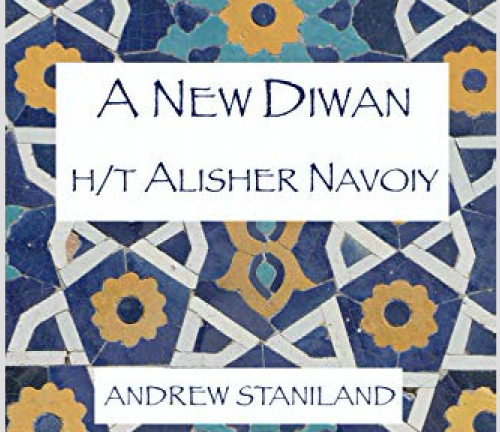Four Poems From “A New Diwan (H/T Alisher Navoiy)”
My collection A New Diwan (h/t Alisher Navoiy) is a sequence of 84 short poems inspired by Uzbekistan, its literature and its culture, with the 15th Century poet as the inspiration presiding over it. Alisher Navoiy was the first great poet to write in Chagatai (a Turkic language which modern Uzbek developed out of), establishing it as a literary language in the same way that Dante established Italian. About a quarter of the poems are either directly about him or in response to his poems.
I am not a scholar, not an expert, and I am a newcomer to Central Asia. So this sequence is really about my discovery of it all. I first became curious about Uzbekistan a few years ago when I read Georges Ivanovitch Gurdjieff’s Meetings With Remarkable Men (1963). He lived in Bukhara for a while and visited a mysterious monastery somewhere in the vicinity (or maybe not). As soon as I saw some photos and saw how beautiful Uzbekistan is, I wanted to visit. I had already written some poems before my first visit, in February this year, just before lockdown, and wrote the rest after I returned to London.
I think there are three main strands of poems in the sequence. I will give you an example of each of them. The first strand has poems that are my impressions of the country and culture. This one needs no introduction:
The fingers’ fork-like grabbing from
an omphalotic pile of plov,
Its greasiness upon them, is
a form of all-absorbing love.
Mouths open, round a midday ta-
ble, sharing in it, if they feud
For this bit, that bit, shut up and
become familiar by food.
The second strand has poems that draw on connections and comparisons between England and Uzbekistan, English poetry and Uzbek poetry. I did not use the phrase “The Silk Road” (except in the blurb on the back cover, which seems to be a editorial requirement for any book about Central Asia). But I think the term is useful as an analogy for the fine threads that connect us all. The next poem continues the culinary theme. To anyone from England, an apple is quintessentially English. But, as you may know, they originate in the mountains of Central Asia:
This apple, ample as it is,
is the enthusiastic aunt
Of a young Cox, a pippin from
an orchard on a farm in Kent.
Up there, the apple’s Adam and
the Eve were on a wild tree, for
Its mountainside to order on-
wards. It has sent the seeds so far.
The third strand is the Navoiy strand. Unfortunately, I cannot read Chagatai and I could only find a few slim volumes of translations in English and French. I thought the French translations were better, partly because, in my opinion, English doesn’t suit the ghazal form (there are too many hard endings for the repeated refrain to work well). Also, it is my impression that the greatness of Navoiy’s poetry is in the elegance of the verse, in the subtle variations on the same subjects and themes, both of which are lost in translation. So I wrote poems about him, about approaching his poems and even about the translations. He likes to play with the word navo (melody) and his pen name derived from it. Here is a poem about him that plays with a few nav- and nov- words:
A navigator of a new-
ly metered idiom he has
No match in, this is Navoiy,
as much an innovator as
An institution that is, e-
ven in an Uzbek novel now,
As unavoidable as when
a novice dabbed a nib to know.
There are also poems inspired by motifs and images in his poems. It is easy to say that his love poems are also allegories of mystical and spiritual experience. But is there more to them than that? What is the specific spiritual teaching in any one poem, as down-to-earth and straightforward a love poem as it is? I did not write any love poems (well, maybe one). But I did write some poems about spiritual experience, as well as analogous poems about the experience of poetry, such as this one:
A line of light along the low
horizon, as the night is end-
Ing, is the ah of an ide-
a, in its impulse to ascend.
A ruba’i is written, then,
in ribbons on the eastern sky,
In red ink or in blue. It is
the rhyme that, rising, is its key.
I am now thinking ahead to my next collection. I hope I will be able to visit Uzbekistan again soon and be inspired by it again. And I hope more (and better) English translations of Navoiy and other poets will soon be available, so many more literary interactions and exchanges will be possible.
Andrew Staniland is a London-based poet.

